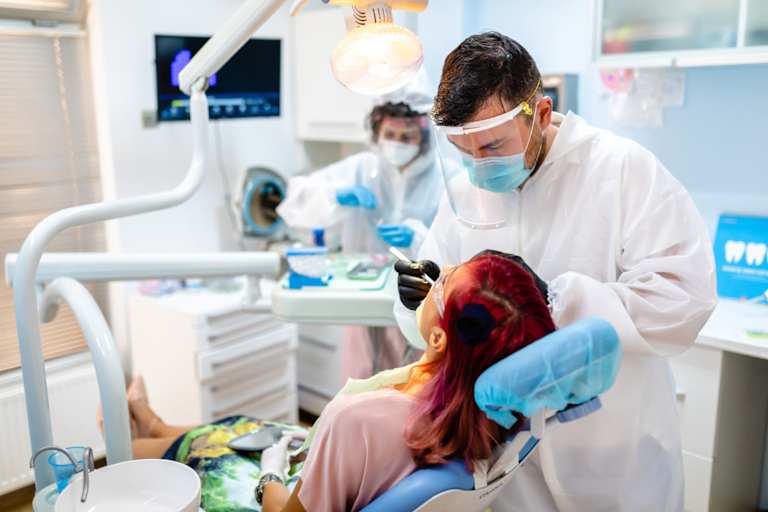Best Accredited Online Trade and Vocational Schools
Interested in online training for a hands-on profession? Vocational schools offer students the opportunity to learn in-demand skills to prepare for a career in the trades. Many programs offer vocational degrees, licensure, and certification programs partially or entirely online.
Online trade schools often afford students more flexibility than in-person programs. For example, learners typically don’t need to relocate to attend online trade school classes. That said, many vocational training programs include in-person components. Be sure to check your prospective program’s specific requirements before enrolling.
Why Take Online Trade School Classes?
- Most trade programs take just 1-2 years to complete, allowing you to enter the workforce quickly.
- You’ll gain in-demand skills through practical, hands-on training.
- Online tech schools can grant you balance and flexibility in your schedule.
- Trade programs often have smaller class sizes, which means more one-on-one instruction.
- Online trade schools are usually more affordable than traditional, in-person programs.
Top 5 Accredited Online Trade Schools
Central Community College
- Grand Island, NE
- 2 year
- Campus + Online
- Accredited
Serving students in Grand Island, Nebraska, CCC offers several online certificate, diploma, and associate degree programs. Students outside of Nebraska must reside in an authorization reciprocity state to attend.
Students can complete associate degrees in a variety of fields such as business administration, health information technology, and early childhood education. In addition, the school offers information technology certificates like Cisco networking and business-related certificates like logistics or entrepreneurship. The school also offers year-long diploma programs for students exploring career choices in similar fields.
Students do not need a high school diploma or GED to apply, but the school prefers students to submit them for placement purposes. Standardized tests or placement exams can help students that need to complete general education courses.
CCC is regionally accredited by the Higher Learning Commission.
76%
$2,880
69%
$4,320
- Acceptance Rate
- N/A
- Students Enrolled
- 6,862
- Institution Type
- Public
Clovis Community College
- Clovis, NM
- 2 year
- Campus + Online
- Accredited
Located in Clovis, New Mexico, CCC offers several online vocational trade degrees and certificates. Students can complete course requirements 100% online with no residency requirements.
Online degree and certification options include several in business administration, paralegal studies, behavioral science, and computer information systems. Associate degree programs require about 60 credits each to complete. Students can complete the certificate of completion programs in about a few months to a year of study. Notable choices include a certificate of achievement in income tax preparation, certificate of achievement in fundamentals of game design, and certificate of completion in legal assistant studies.
The school prefers students to possess a high school diploma to apply for associate degree programs. For certificate of achievement choices, students must submit a completed application and take placement tests. The school offers counseling and advising services for online students and does not require standardized tests to begin the admission process.
CCC is regionally accredited by the Higher Learning Commission.
56%
$1,416
57%
$2,904
- Acceptance Rate
- 100%
- Students Enrolled
- 2,328
- Institution Type
- Public
Northwood Technical College
- Shell Lake, WI
- 2 year
- Campus + Online
- Accredited
Located in Shell Lake, Northwood Technical College offers 37 online associate degrees, certificates, and technical diplomas, offering students a jumpstart in in-demand fields.
Students can choose one of 11 associate degrees, including accounting, early childhood education, health information technology, and medical and administrative professional. The school also offers certificates in customer service, management, group childcare essentials, and tax preparer assistant. Learners can also participate in technical diplomas with concentrations such as drafting technician, medical billing specialist, office technology assistant, or office support technician. Students wanting to work in childcare settings can choose a one-year technical diploma in childcare services, completing the first year of the associate degree for fast employment.
The school offers credit for prior learning and a generous transfer credit policy. Applicants do not need a high school diploma, but possessing one makes the placement process easier.
NTC is regionally accredited by the Higher Learning Commission.
68%
$4,524
74%
$6,583
- Acceptance Rate
- N/A
- Students Enrolled
- 2,668
- Institution Type
- Public
West Kentucky Community and Technical College
- Paducah, KY
- 2 year
- Campus + Online
- Accredited
Located in Paducah, WKCTC offers online vocational trade degrees, diplomas, and certificates in several in-demand fields.
The school offers several associate degrees in fields like computer and information technology, logistics and operations management, and medical information technology. The school also offers a unique degree or certificate in marine technology, preparing students for life on the water. Students seeking other certificate programs for fast employment can choose from the same fields as those above but graduate from the program in just a few months.
Most students complete the school's 39- to 43-credit diploma programs in about one year. Notable choices include medical information technology, computer-aided drafting and design, and business administration systems.
Students applying to associate programs ideally possess a high school diploma or GED equivalent. Diploma and certificate choices require students to submit a completed application for the college.
WKCTC is regionally accredited by the Southern Association of Colleges and Schools Commission on Colleges.
48%
$4,464
71%
$6,000
- Acceptance Rate
- N/A
- Students Enrolled
- 5,132
- Institution Type
- Public
Wiregrass Georgia Technical College
- Valdosta, GA
- 2 year
- Campus + Online
- Accredited
Located in Valdosta, Wiregrass offers online degrees, diplomas, and technical certificates, allowing students to complete courses without coming to campus.
Students can begin with certificates in fields like child development specialist, technical specialist, and fire officer. Students can complete most certificates in a matter of months. Some departments also offer diploma choices — including fire science technology and accounting — allowing students to specialize further with a one-year program. Full associate degrees include fire science technology, accounting, business management, and criminal justice technology. The programs follow the same structure as on-campus classes, but most happen asynchronously.
Students do not need a high school diploma or GED to apply but need to send transcripts of any completed school work. Wiregrass is regionally accredited by the Southern Association of Colleges and Schools Commission on Colleges.
50%
$2,400
64%
$4,800
- Acceptance Rate
- N/A
- Students Enrolled
- 4,380
- Institution Type
- Public
Why Accreditation Matters for Trade School
Postsecondary institutions are evaluated by independent agencies to ensure quality. This process, called accreditation, checks if they meet set standards. Degrees from unaccredited schools may not be widely accepted, and you might not be eligible for federal financial aid.
Potential employers may prefer or require that you graduate from an accredited trade school or program since accreditation verifies that your curriculum meets field-specific standards.
Many agencies accredit trade schools and programs, including:
- Accrediting Commission of Career Schools and Colleges
- Accrediting Council for Continuing Education & Training
- Council on Occupational Education
Can You Learn a Trade Online?
Yes, you can attend trade and vocational schools online. But how does it work exactly?
Online trade schools blend virtual coursework with practical, hands-on training. These programs prepare you for popular roles such as licensed practical nurse, HVAC technician, plumber, and electrician.
Some trades may require additional training in the form of an apprenticeship.
To enroll in an online vocational certificate program or associate degree program, you’ll need a high school diploma or GED certificate. Some trade schools also accept the HiSET.
If you don’t have a high school diploma or equivalent credential, consider taking GED prep classes, which many community colleges offer at little to no cost.
Find Online Trade School Classes and Programs
Are Online Trade Schools Worth It?
Median Annual Wage by Typical Entry-Level Education
$47,150
High school diploma or equivalent
$48,980
Postsecondary certificate or diploma
$63,280
Associate degre
Reasonable costs, increasing job demand, and promising earning potential allow online trade schools to offer a strong return on investment.
For reference, public, below-associate-level schools charge an average of $11,000, and private institutions of the same level charge an average of $18,000, according to the National Center for Education Statistics. Two-year institutions charge lower tuition on average — around $5,000 at public and $17,000 at private schools.
It may not take you long to recoup your costs once you start working: Occupations that only require a certificate/diploma for entry (which include many trades) earned a median annual salary of $48,980 in 2024, according to the Bureau of Labor Statistics (BLS). That’s over $1,800 more per year than the median earnings for jobs that only require a high school diploma.
Additionally, BLS data shows that unemployment rates typically decrease with higher levels of education, such as some college or an associate degree.
Skilled trades also face persistent demand. McKinsey projects annual hiring for critical trades, like welding and carpentry, to outpace overall new job growth by more than 20 times from 2022-2032.
Frequently Asked Questions
Before enrolling at an online trade school, you should confirm that the school or program is accredited. Prioritize attending a nonprofit school, such as a community college, over a for-profit school.
Ideally, the school should also have decent retention and graduation rates and offer career resources that help students transition into the workforce. Consider reaching out to alumni to gain more insight into the quality of the faculty, curriculum, and resources.








